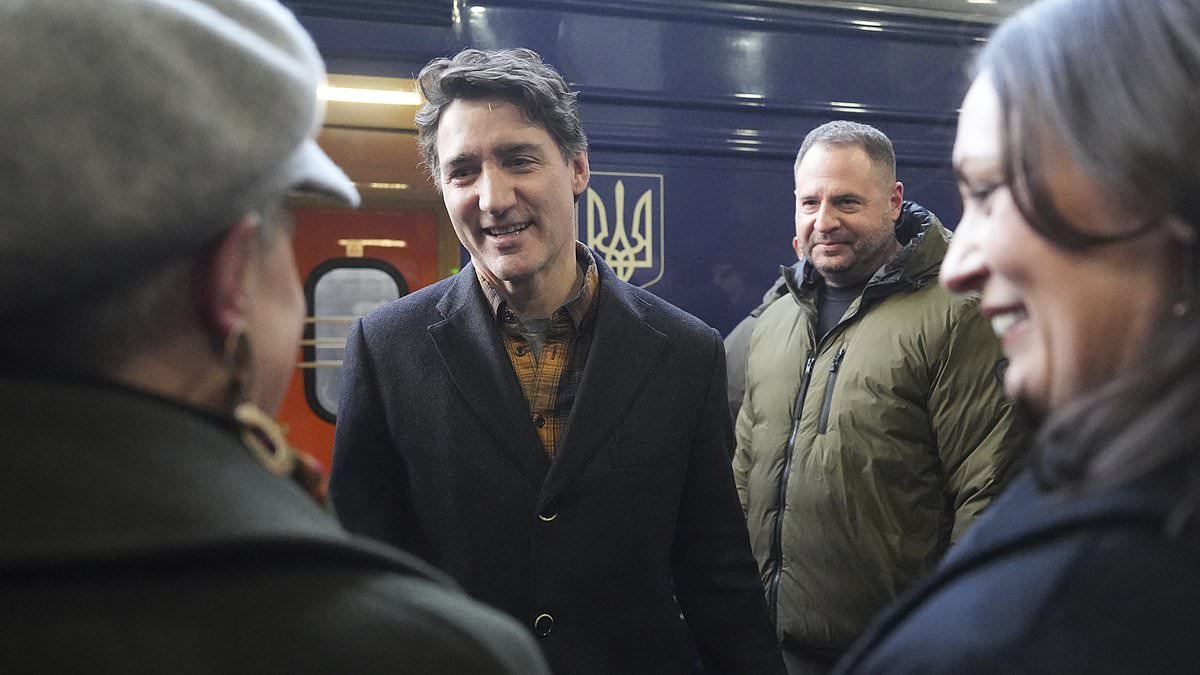World leaders are meeting in the Ukrainian capital today to mark three years since Russia’s illegal invasion of the country, in a show of support by some of Kyiv’s most important backers as the United States threatens to pull its support.
The three-year mark of the war came at a sensitive moment for Kyiv as Volodymyr Zelensky navigates a rapidly changing international environment upended by Donald Trump’s major shift of US policy and warming relations with Moscow.
Washington has been accused of freezing Kyiv out of negotiations with Moscow, with Trump last week justifying doing so by wrongly calling Zelensky ‘a dictator without elections’ – despite votes only being halted in the war-torn country due to martial law.
The Ukrainian President yesterday conceded that he was willing to step down of it meant securing peace for his country, suggesting that he could do so in exchange for Ukraine’s entry into NATO or other security guarantees.
But Ukraine’s allies have sought to rally around the President, with European Commission president Ursula von der Leyen and Canadian prime minister Justin Trudeau among those flocking to Kyiv today to show their support and hold emergency talks.
The high-profile visitors, who also included European Council president Antonio Costa as well as the prime ministers of Northern European countries and Spain, were greeted at the train station by Ukrainian foreign minister Andrii Sybiha and the Zelensky’s chief of staff Andrii Yermak.
Europe was in Kyiv ‘because Ukraine is in Europe,’ von der Leyen wrote on X, adding: ‘In this fight for survival, it is not only the destiny of Ukraine that is at stake. It’s Europe’s destiny.’
Sir Keir Starmer is not among those visiting the country but is set to join world leaders in a call hosted by Zelensky later today, and has this morning reiterated the UK government’s support for Kyiv.
‘Three years on from Putin’s barbaric full-scale invasion of Ukraine, we face a once in a generation moment for our collective security and values,’ he wrote on X. ‘We continue to stand with Ukraine for a just and lasting peace.’
In the latest sign of Europe’s efforts to rework its strategy on Ukraine to respond to Trump’s actions, Costa announced that he would convene an emergency summit of the 27 EU leaders in Brussels on March 6, with Ukraine at the top of the agenda.
‘We are living a defining moment for Ukraine and European security,’ Costa said in a post on social media.
The US leader has sought to follow through on his campaign promises to end the war quickly, though his methods for doing so have alarmed many in Ukraine and Europe who believe that his approach is too conciliatory toward Russia and its president, Vladimir Putin.
Russia’s foreign ministry said on Saturday that preparations for a face-to-face meeting between Trump and Putin were under way, and US officials have said that they had agreed with Moscow to re-establish diplomatic ties and restart economic co-operation.
And on Sunday, Russian deputy foreign minister Sergei Ryabkov told the state Tass news agency that Moscow and Washington would continue bilateral talks at the end of next week, adding that ‘quite a lot’ of contact was ongoing between the Russian and American sides.
Leaders across the EU, fearing both that Trump’s approach to Ukraine would lead to an unfavourable settlement for Kyiv and that they – some of Ukraine’s most important supporters – would be sidelined in negotiation for peace, have rushed to assert their own response to the rapidly shifting environment.
The EU’s top diplomat on Monday insisted that the US cannot seal any peace deal to end the war with Putin without Ukraine or Europe being involved.
Kaja Kallas highlighted what she claimed were pro-Russian positions being taken up by the Trump administration.
‘You can discuss whatever you want with Putin. But if it comes to Europe or Ukraine, then Ukraine and Europe also have to agree to this deal,’ Ms Kallas told reporters in Brussels, where she is chairing a meeting of EU foreign ministers.
Ms Kallas travels to Washington on Tuesday for talks with US secretary of state Marco Rubio.
Asked whether the US administration is acting in the interests of Russia or Ukraine’s Western backers, she said: ‘If you look at the messages that come from the United States, then it’s clear that the Russian narrative is there very strongly represented.’
Kallas rejected Trump’s earlier inflammatory assertion that Zelensky was a dictator for not having held elections after his regular term expired last year, saying, ‘Putin hasn’t had elections, or Russia hasn’t had elections, in 25 years.’
Ukrainian law prohibits elections being held while martial law is in place, and Zelenksy said as recently as Sunday that after martial law is lifted ‘there will be elections and people will make their choice’.
